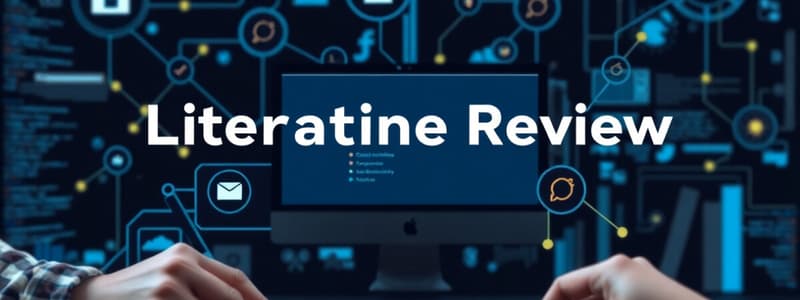Podcast
Questions and Answers
What primary function does Zeta Alpha provide to researchers?
What primary function does Zeta Alpha provide to researchers?
- Generate research papers automatically
- Provide free access to all articles
- Conduct literature reviews manually
- Enhance knowledge discovery using AI (correct)
How does Consensus.app assist researchers?
How does Consensus.app assist researchers?
- By offering free workshops on writing
- By summarizing research papers (correct)
- By providing unfiltered access to all research data
- By publishing peer-reviewed articles
What unique capability does Semantic Scholar offer regarding research papers?
What unique capability does Semantic Scholar offer regarding research papers?
- Editing and formatting services
- Translation of papers into multiple languages
- Summarization and citation analysis (correct)
- Creation of original research papers
What is the main purpose of Humata AI's data visualization tools?
What is the main purpose of Humata AI's data visualization tools?
What function does Inciteful provide to enhance academic research?
What function does Inciteful provide to enhance academic research?
What does Elicit primarily help researchers find?
What does Elicit primarily help researchers find?
Which tool is designed for automatic summarization of research papers?
Which tool is designed for automatic summarization of research papers?
What does the citation network in Semantic Scholar help researchers to do?
What does the citation network in Semantic Scholar help researchers to do?
Flashcards
Zeta Alpha
Zeta Alpha
An AI platform for knowledge discovery using neural search and generative AI.
Inciteful
Inciteful
A free tool that leverages citations to speed up academic research and connect ideas across different fields.
Consensus.app
Consensus.app
An AI tool that summarizes research papers to make relevant studies easy to find and understand quickly.
Semantic Scholar
Semantic Scholar
Signup and view all the flashcards
Humata AI
Humata AI
Signup and view all the flashcards
Elicit
Elicit
Signup and view all the flashcards
SciSpace
SciSpace
Signup and view all the flashcards
Neural Search
Neural Search
Signup and view all the flashcards
Study Notes
AI Tools for Literature Review
-
Tools for Literature Collection:
- Google Scholar, Scopus, Clarivate Web of Science, and other resources are used to discover relevant literature.
- Zotero imports and manages discovered literature.
- Research Rabbit, Obsidian (note-taking), and other tools help to collect and organize literature details.
-
Tools for Literature Analysis:
- SciSpace facilitates relevant article search and streamlines literature review.
- Litmaps, Seedmaps, Scite.ai, and Litmaps facilitate efficient literature analysis.
- Obsidian, Draw.io, and other tools help organize and visualize connections between papers.
-
Tools for Literature Synthesis:
- SciSpace helps discover connections and gaps.
- Tools like Scite.ai, Litmaps, and Obsidian can help identify relevant papers.
- Tools help understand connections and find knowledge gaps.
-
AI Research Discovery Platforms:
- Zeta Alpha Neural Discovery Platform uses Generative LLMs and advanced Neural Search for knowledge discovery.
- The tool leverages the latest Neural Search and Generative AI techniques.
- Helps users organize, share, and explore internal knowledge efficiently.
-
Inciteful:
- Provides free tools including Paper Discovery and Literature Connector to accelerate research.
- This platform leverages citations for efficiency.
- Builds on open data and continuously develops features.
-
Consensus AI:
- Is an AI-powered academic search engine grounded in science.
- Finds the best papers and provides instant insights and topic synthesis.
-
Semantic Scholar:
- Is a free AI-powered research tool for scientific literature.
- Helps scholars discover relevant research using AI and engineering to understand the semantics of scientific literature.
-
Humata AI:
- Utilizes Natural Language Processing (NLP) to analyze research papers and extract meaningful insights.
- Machine Learning is applied to reveal correlations from datasets.
- Data Visualization assists in identifying trends.
-
Elicit:
- Is an AI tool designed to locate "seed articles" and extract relevant keywords/subject headings.
- Enters questions and returns alternative queries for further discoveries.
Studying That Suits You
Use AI to generate personalized quizzes and flashcards to suit your learning preferences.




